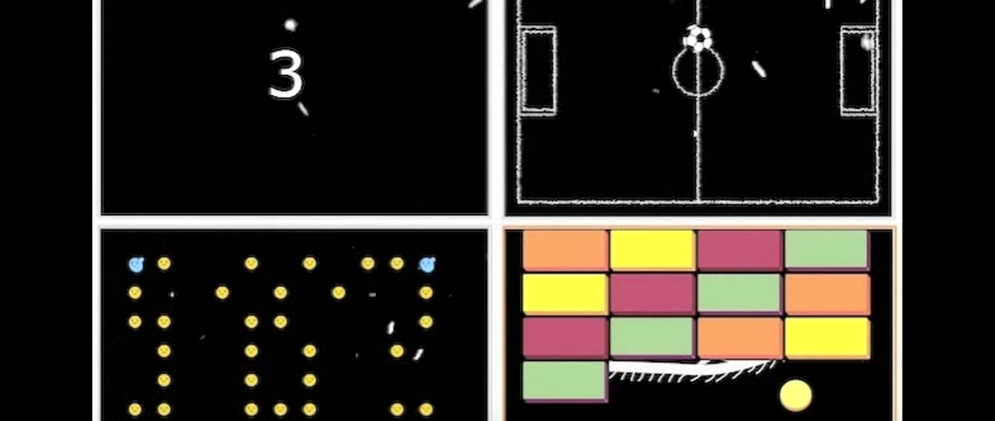A New Generation of Hybrid Tangible Interfaces for Learning
From The Theme
FUTURE OF CONTENT
WHAT IF
What if we could combine online experimentation with wetlab experiences for science and engineering education?

WHAT WE SET OUT TO DO
We set out to develop and test a scalable and cost-effective platform that combined the best features of online open education with the established benefits of wetlab experiences. Our goal was to enable students to remotely engage in real-time laboratory experiments.
WHAT WE FOUND
We created experimental platforms with technological infrastructure for remote, scalable wet labs. One platform permits chemical stimulation of cell culture systems; the other platform permits real life interaction with microorganisms and provides real time feedback to users. Both are capable of engaging up to 100 students in parallel. The user interfaces are adaptable to laptop or smart phone, permit robotic control of reagents, afford time-lapse movies of the experiments with VCR controls, and include a discussion board. Use of the platforms has been piloted with college students.
LEARN MORE
mediaX Research Project Update, Fall 2013
mediaX Research Theme Update, Spring 2013
Watch Videos About This Project
December 2016 Stanford Report Story
Decemebr 2016 Nature.com Story
October 2016 Stanford Report Story
PEOPLE BEHIND THE PROJECT
 At the time of the project, Paulo Blikstein was an Assistant Professor at the Stanford Graduate School of Education where he directed the Transformative Learning Technologies Lab and the global FabLearn Program. Blikstein’s research focuses on how new technologies can deeply transform the learning of science, technology, engineering, and mathematics. He creates and researches cutting-edge educational technologies, such as computer modeling, robotics, digital fabrication, and rapid prototyping, creating hands-on learning environments in which children learn STEM disciplines by building sophisticated projects and devices. As of 2018, Dr. Blikstein is the Associate Professor of Communication, Media & Learning Technologies Design in the Department of Mathematics, Science & Technology.
At the time of the project, Paulo Blikstein was an Assistant Professor at the Stanford Graduate School of Education where he directed the Transformative Learning Technologies Lab and the global FabLearn Program. Blikstein’s research focuses on how new technologies can deeply transform the learning of science, technology, engineering, and mathematics. He creates and researches cutting-edge educational technologies, such as computer modeling, robotics, digital fabrication, and rapid prototyping, creating hands-on learning environments in which children learn STEM disciplines by building sophisticated projects and devices. As of 2018, Dr. Blikstein is the Associate Professor of Communication, Media & Learning Technologies Design in the Department of Mathematics, Science & Technology.
 Ingmar Riedel-Kruse is an Assistant Professor of Bioengineering at Stanford University. The Riedel-Kruse lab combines basic research and engineering approaches by working on (1) biophysics of development and (2) biotic games. The lab uses theoretical / computational as well as experimental approaches based on molecular, cellular, developmental biology; zebrafish; imaging; physics; informatics / computer sciences; micro-fluidics; and engineering.
Ingmar Riedel-Kruse is an Assistant Professor of Bioengineering at Stanford University. The Riedel-Kruse lab combines basic research and engineering approaches by working on (1) biophysics of development and (2) biotic games. The lab uses theoretical / computational as well as experimental approaches based on molecular, cellular, developmental biology; zebrafish; imaging; physics; informatics / computer sciences; micro-fluidics; and engineering.
 Zahid Hossaid received his PhD in Computer Science from Stanford University. He worked on developing systems that allow citizen scientists and students to interactively run real biology experiments over the Internet, as well as other research that combines his interest in computer graphics and visualization with biology.Starting in 2017, Hossain joined Meta Co. as a Senior Software Engineer.
Zahid Hossaid received his PhD in Computer Science from Stanford University. He worked on developing systems that allow citizen scientists and students to interactively run real biology experiments over the Internet, as well as other research that combines his interest in computer graphics and visualization with biology.Starting in 2017, Hossain joined Meta Co. as a Senior Software Engineer.
 Sean Choi is a Ph.D. Candidate in Department of Electrical Engineering at Stanford University. His current research work is about adding programmability to network switches via a domain specific language called P4. P4 is a protocol-independent and target-independent language, that is capable of quickly and easily defining a function of a network object (i.e. a data-center switch). His research is currently being advised by Professor Nick McKeown.
Sean Choi is a Ph.D. Candidate in Department of Electrical Engineering at Stanford University. His current research work is about adding programmability to network switches via a domain specific language called P4. P4 is a protocol-independent and target-independent language, that is capable of quickly and easily defining a function of a network object (i.e. a data-center switch). His research is currently being advised by Professor Nick McKeown.
 Brogan Miller was the Program Director of the TLTL and FabLearn, the implementation arm of the TLTL. He has designed a number of open-source “fabbable” educational tools, ran workshops with students aged 9 to 50 in over 4 different countries, and has consulted many teachers on the logistical and pedagogical design of a FabLab. Brogan managed the FabLearn Conference, the FabLearn Fellows program, rans the TLTL’s lab, and is a part of the team working on designing various upcoming TLTL / FabLearn websites. From 2016 onwards, he was the Mechanical Engineer of Sensel.
Brogan Miller was the Program Director of the TLTL and FabLearn, the implementation arm of the TLTL. He has designed a number of open-source “fabbable” educational tools, ran workshops with students aged 9 to 50 in over 4 different countries, and has consulted many teachers on the logistical and pedagogical design of a FabLab. Brogan managed the FabLearn Conference, the FabLearn Fellows program, rans the TLTL’s lab, and is a part of the team working on designing various upcoming TLTL / FabLearn websites. From 2016 onwards, he was the Mechanical Engineer of Sensel.